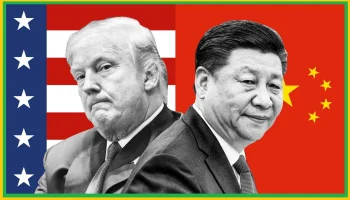📰 US-China Trade Talks Resume Amid Global Pressure
Table of Contents
ToggleWashington/Beijing, July 11, 2025 – After nearly two years of diplomatic silence, the US-China trade talks have officially resumed in Geneva, sparking hope across global markets. With both economic giants under pressure from rising inflation, tech disruptions, and supply chain crises, the talks are being closely watched worldwide.
The key agenda points include tariff reductions, chip exports, and the creation of a framework for AI regulation—all pivotal to stabilizing the global economy.
🌐 What Triggered the Renewed US-China Trade Talks?
The renewed US-China trade talks come at a time when both nations face mounting economic challenges and political scrutiny. The US is grappling with an election-year economic slowdown, while China is dealing with sluggish exports and a real estate crisis.
Global bodies, including the World Trade Organization (WTO) and G20, have called on both countries to de-escalate trade tensions that have persisted since the Trump-era tariff wars.
💼 Key Focus Areas in the Ongoing Negotiations
1️⃣ Tariff Reductions
Both nations are considering rolling back tariffs on over $350 billion worth of goods. Industries like electronics, textiles, and automotive parts could benefit significantly.
2️⃣ Chip Export Agreements
With the global semiconductor race heating up, the US is pressing for controlled yet strategic chip exports to China. Meanwhile, China is pushing for greater access to manufacturing tools and design software.
3️⃣ AI Regulation Framework
In a groundbreaking move, the US and China are discussing a joint AI oversight mechanism. The framework aims to:
Prevent misuse of AI in military systems
Ensure ethical AI development
Protect personal data across borders
💬 Official Statements and Global Reaction
US Trade Representative Katherine Tai stated,
“This is a pivotal moment to bring transparency, fairness, and predictability to global trade. We’re engaging China in a serious and forward-looking dialogue.”
China’s Ministry of Commerce also expressed optimism, calling the renewed US-China trade talks a “constructive step toward mutual stability.”
Global stock markets have reacted positively, with the Dow Jones, Nikkei, and Shanghai Composite all seeing modest gains following news of the resumed discussions.
📉 Why These Talks Matter Globally
The outcome of these US-China trade talks could impact:
Global inflation and commodity prices
Tech supply chains, especially in AI and semiconductors
Geopolitical stability, particularly in the Indo-Pacific region
Countries like India, South Korea, and Germany are watching the developments closely, as they hold stakes in global chip alliances and trade flows.

🧩 Conclusion: High Stakes, Cautious Optimism
As the US-China trade talks continue behind closed doors, the world hopes for a turning point in one of the most consequential economic relationships of our time. Whether these negotiations lead to lasting cooperation or temporary calm remains to be seen—but the signals so far are promising.
📌 Frequently Asked Questions (FAQ)
❓ Why have the US-China trade talks resumed now?
The US-China trade talks have resumed after a two-year pause due to growing global pressure to stabilize markets. Both countries are facing economic slowdowns, and there is mounting concern over tariffs, AI governance, and supply chain disruptions.
❓ What are the main topics being discussed in the US-China trade talks?
The three major focus areas are:
Tariff reductions on goods valued at over $350 billion
Semiconductor and chip exports, with the US pushing for regulated tech sharing
AI regulations, including ethical standards and data protection
❓ Where are the trade negotiations taking place?
The current round of US-China trade talks is being held in Geneva, Switzerland, under the observation of international trade bodies such as the WTO and G20.
❓ What impact could tariff cuts have globally?
Tariff reductions could lower prices on electronics, vehicles, textiles, and more, easing global inflation. They could also improve trade flows, benefiting allied economies like India, South Korea, and Germany.
❓ Why are chip exports a sensitive topic in the talks?
Semiconductors are vital for everything from smartphones to military tech. The US is concerned about misuse, while China wants better access to chip-making equipment. The talks aim to strike a balance between security and trade.
❓ Are the US and China creating joint rules for artificial intelligence?
Yes, discussions are underway to establish a bilateral AI regulatory framework, focusing on:
Preventing misuse of AI in warfare
Ensuring ethical AI development
Creating transparency in data usage across borders
❓ What does this mean for India and other countries?
If successful, these trade talks could:
Stabilize global markets
Reopen tech export routes
Influence how countries like India regulate AI and negotiate trade with both superpowers
❓ How can I follow the updates on US-China trade talks?
You can stay updated through:
Official releases from USTR and China’s Ministry of Commerce
WTO and G20 press briefings




